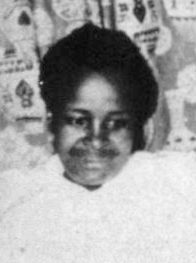Stella Madzimbamuto | |
|---|---|
 Madzimbamuto before 1969 | |
| Born | Stella Nkolombe 13 April 1930 |
| Died | 30 June 2020 (aged 90) |
| Occupation(s) | Nurse, Zimbabwean nationalist, civil rights activist, women's rights activist |
| Years active | 1948–1995 |
| Spouse | Daniel Madzimbamuto |
| Children | 4; including Farai D. |
Stella Madzimbamuto (13 April 1930 – 30 June 2020) was a South African-born Zimbabwean nurse and plaintiff in the landmark legal case of Madzimbamuto v Lardner-Burke. Born as Stella Nkolombe in District Six of Cape Town in 1930, she trained as a nurse at South Africa's first hospital to treat black Africans, earning a general nursing and a midwifery certification. After working for three years at Ladysmith Provincial Hospital, she married a Southern Rhodesian and relocated. From 1956 to 1959, she worked as a general nurse at the Harare Central Hospital. In 1959, her husband, Daniel Madzimbamuto, was detained as a political prisoner. He would remain in detention until 1974, while she financially supported the family.
From 1960, Madzimbamuto worked as the nurse in charge of Ward B6, the Spinal and Head Injuries Unit, of Harare Hospital. She was trained by the only Africa-based neurosurgeon at the time, British physician Laurence Levy. He arranged for her to study abroad at Stoke-Mandeville National Spinal Injuries Centre in Buckinghamshire and the National Hospital for Neurology and Neurosurgery in Queen Square, London, earning certifications in the treatment of neurological and spinal injuries. Upon her return to Rhodesia, in 1965, she developed a curriculum based on her studies to train junior nurses. She worked as the lead nurse in Ward B6 until 1982. That year, she became the night matron of Harare Hospital and served in this role until her retirement in 1995.
In 1965, Madzimbamuto challenged the detainment of her husband in a lawsuit, maintaining that if the government of Rhodesia, which had declared independence from Britain, was illegal, then the detention orders the government had issued were invalid. Her case was defeated in the Rhodesian courts, but she appealed to the Judicial Committee of the Privy Council, which was the highest court for many Commonwealth countries, including Rhodesia. The Judicial Committee reversed the decision of the High Court of Rhodesia. It declared the Rhodesian government to be illegal, laws and proclamations issued by it to be invalid, and ordered Madzimbamuto's husband to be released. The Rhodesian government ignored the decision, but it has become a landmark decision regarding the issue of state sovereignty.